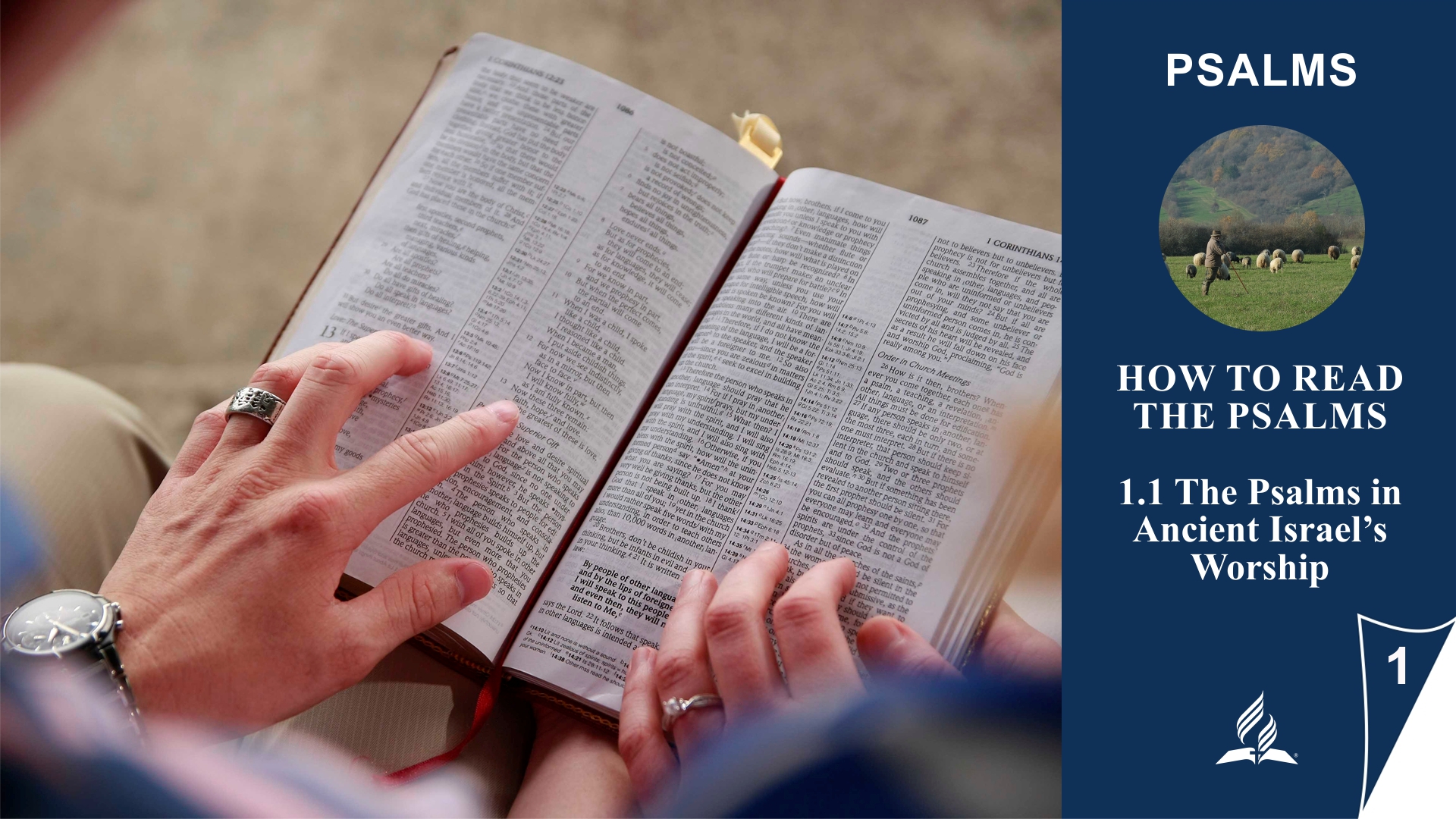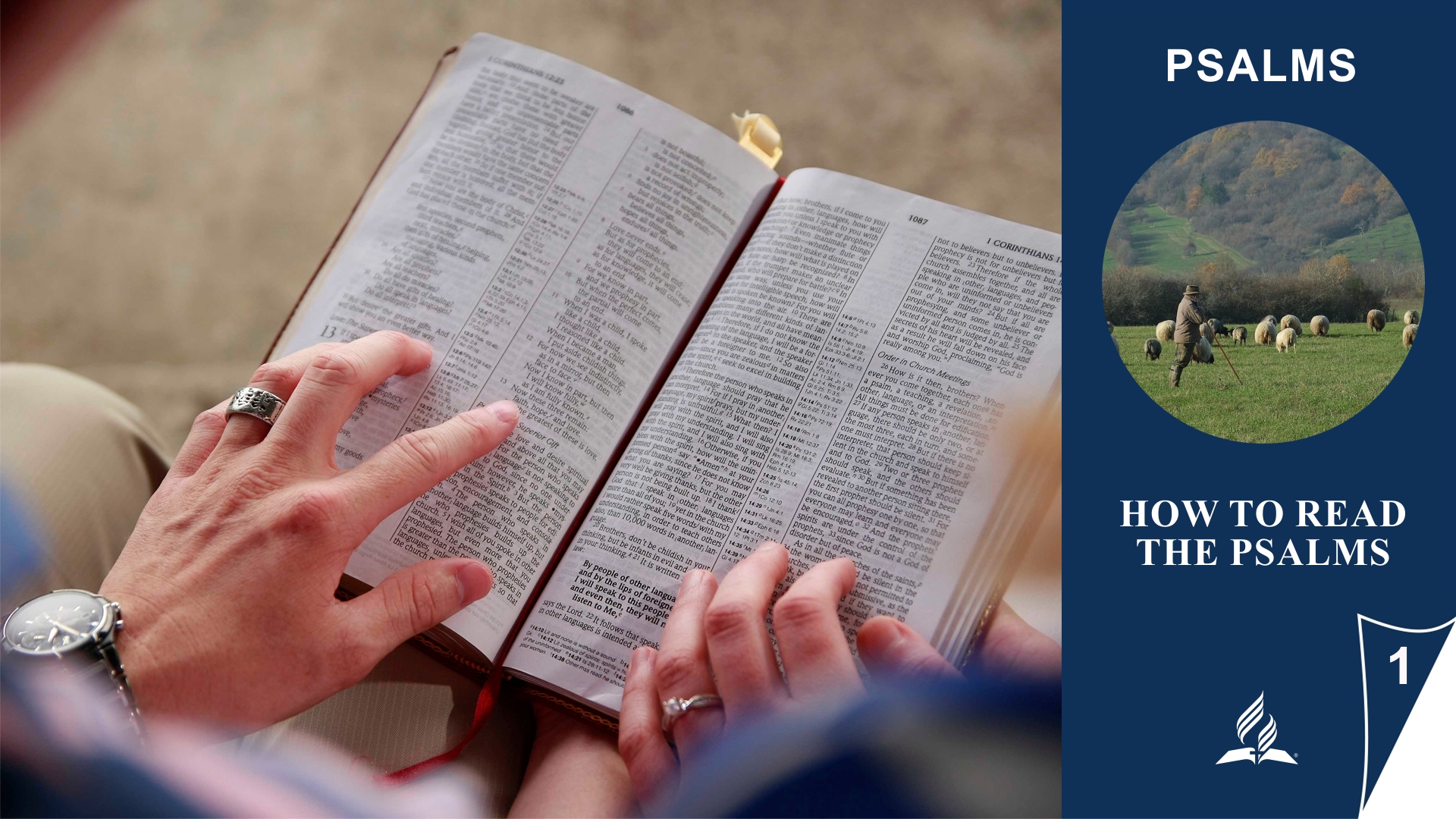


Lesson 1. How to Read the Psalms
Immerse in the Psalms: A Journey of Discovery through Praise and Worship
The first lesson introduces us to the fascinating world of the Psalms, a book of the Bible that encompasses a wide range of human emotions, prayers, and praises. In this lesson, we will explore how to read the Psalms to grasp their diversity, historical context, and spiritual significance. We will examine the role of the Psalms in the worship of ancient Israel and understand how these inspired texts continue to play a central role in the life of faith today. By considering Jesus’ use of the Psalms, we gain insights into their enduring significance for Christian faith. Let’s dive together into the rich world of the Psalms and discover how they can speak to us in various life situations, leading us to a deep connection with God.

1.1 The Psalms in Ancient Israel’s Worship
The Role of Psalms in Ancient Israelite Worship
Read 1 Chronicles 16:7, Nehemiah 12:8, Psalm 18:1, 30:1, 92:1, 95:1, 105:2, Colossians 3:16, and James 5:13. What occasions led to the composition of some Psalms? When did the people of God use Psalms?
The Psalms played a central role in the worship of ancient Israel and were used on various occasions:
-
Temple Worship and Religious Festivals: Psalms were sung as hymns in the temple and were also used during religious festivals, temple dedications, and processions.
-
Temple Dedications: Psalms were sung during the dedication of the temple to express the holiness of God and the gratitude of the people.
-
Pilgrimages to Jerusalem: “Songs of Ascent” or “Pilgrim Songs” (Psalm 120–134) were sung during pilgrimages to Jerusalem, especially during the three major annual festivals.
-
Passover Ceremony: The “Egyptian Hallel” (Psalm 113–118) held a significant place in the Passover ceremony. Some Psalms were sung at the beginning, and others at the end of the Passover meal.
-
Daily Prayers in the Synagogue: The “Daily Hallel” (Psalm 145–150) was integrated into the daily prayers in the morning service of the synagogue.
-
Guidance for Worship: The Psalms served not only as hymns of praise but also instructed the people on how to worship God in the sanctuary. They were a source of guidance and inspiration for worship.
-
Key Events in Jesus’ Life: Jesus himself prayed using the words of Psalm 22 (Matthew 27:46), indicating that the Psalms played a role in the personal prayer and spiritual life of believers.
-
In the Early Church: The Psalms continued to be used in the early Christian community, as evident in the New Testament writings, such as Colossians 3:16 and Ephesians 5:19.
Even though we don’t worship God in an earthly sanctuary like the temple, how can we use the Psalms in our own worship, whether in private or communal settings?
The Psalms offer a rich source of spiritual inspiration and can be used in various forms of worship, both in private and communal settings. Here are some ways to incorporate the Psalms into your worship:
-
Praise and Worship: The Psalms are full of praise and worship. They can be used in worship services to extol the greatness of God and express our devotion. Psalms like 95, 96, and 100 are good examples of praise songs.
-
Prayer and Supplication: Many Psalms are prayers expressing human emotions, joys, and concerns. They can be used in the prayer section of the worship service to present personal and communal needs before God.
-
Repentance and Turning: Psalms expressing repentance and turning to God can be included in times of repentance and self-examination. For example, Psalms 51, 32, and 130 could be used.
-
Teaching Material: Some Psalms contain teachings and wisdom. They can serve as a foundation for preaching and teaching in the worship service. Psalms like 1, 19, and 119 offer rich spiritual insights.
-
Worship Design: Psalms can be used in the liturgical design of the worship service, whether through readings, responsive prayers, or as a basis for chants and songs.
-
Communal Singing: The Psalms were originally written as songs and are particularly suitable for communal singing. Many churches use Psalms as the basis for praise and worship songs.
-
Personal Devotion: On a personal level, you can use Psalms in your daily devotion. They provide comfort, encouragement, and guidance for personal prayer life.
-
Celebrating God’s Faithfulness and Deeds: Psalms often recall God’s actions in the history of Israel. They can be used to celebrate God’s faithfulness and power, both in the past and the present.
The Psalms are versatile and can be adapted in different contexts to cover various aspects of the life of faith. By integrating Psalms into your worship, you can promote a deeper spiritual experience both individually and communally.

The connection of the text “The Psalms in the Worship of Ancient Israel” with our daily lives and faith lies in the practical application of the Psalms in various forms of worship, whether in private or communal settings.
-
Praise and Worship: The Psalms are rich in praise and worship and can be used in worship to praise the greatness of God and express our devotion. By using Psalms such as Psalm 95, 96, and 100, we can strengthen our faith and deepen our relationship with God.
-
Prayer and Supplication: Many Psalms are prayers that express human emotions, joys, and concerns. In the prayer part of worship, we can use Psalms to bring personal and communal concerns before God. This allows us to identify with the Psalms and open our hearts to God.
-
Repentance and Turning: Psalms that express repentance and turning can be incorporated into times of repentance and self-examination. By using Psalms such as Psalm 51, 32, and 130, we can confess our sins and align ourselves with God’s forgiveness and grace.
-
Teaching Materials: Some Psalms contain teachings and wisdom that can serve as a basis for preaching and teaching in worship. By considering Psalms such as Psalm 1, 19, and 119, we can gain spiritual insights and deepen our understanding of God’s Word.
-
Worship Design: Psalms can also be used in the liturgical design of worship, whether through readings, responsive prayers, or as the basis for chants and songs. By integrating Psalms into the structure of worship, we can facilitate a deeper spiritual experience and invite participants to active participation.
-
Communal Singing: The Psalms were originally written as songs and are therefore particularly suitable for use in communal singing. By using Psalms as the basis for praise and worship songs, we can create an atmosphere of unity and devotion that enriches worship and strengthens community life.
-
Personal Devotion: On a personal level, we can use Psalms in our daily devotions. They offer comfort, encouragement, and guidance for personal prayer life and allow us to develop a deeper relationship with God by integrating his words into our daily lives.
Through the deliberate integration of Psalms into our worship, we can foster a diverse and dynamic experience of faith that brings us closer to God and supports our spiritual growth.
(Visited 10 times, 1 visits today)




















